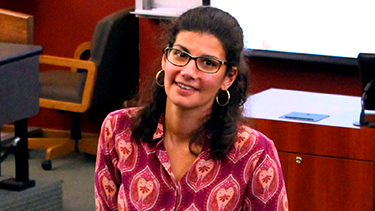Hofstra Law Review Publishes “The Prisonization of America’s Public Schools” by Professor Ahranjani
October 26, 2017 - Janine Caller, Class of 2019

Students who have not taken a class with Professor Maryam Ahranjani may not be aware of her dedication to the rights of young people. She is the co-author of the book Youth in America, the text book used to help law students teach the rights of young people to high school students for the Marshall Brennan Constitutional Literacy Project.
Ahranjani is also the faculty advisor for the UNM chapter of the Marshall- Brennan program and helps facilitate Constitution Day, which brought high school students to UNM Law School to tour the campus and learn about the law as a career. She has also recently written an article for the Washington Post about transgender students’ access to school restrooms.
InThe Prisonization of America’s Public Schools, Ahranjani examines the current state of many public schools, especially urban high schools, and their likeness to prisons. The article discusses how, due to the perception of mass school violence, individual liberties of many students, particularly African-American and Latino, are limited in the name of security. She notes that prisonization practices may have lasting effects on students, and their lives after high school, contributing to the school-to-prison-pipeline. Ahranjani explains, “While mass violence occupies our hearts and minds as a society, it is a mistake to treat public schools as prisons in response.”
Erin Phillips, class of 2019, took Ahranjani’s Criminal Law class last year and is a current fellow with the Marshall Brennan Program this semester. “In the classroom, Professor Ahranjani empowers her students to grapple with difficult questions and encourages them simultaneously to push themselves and to be patient with themselves as they go through the learning process” says Phillips. “Her investment in her students is astounding. In any conversation with her, it is abundantly clear how passionate she is about her work and about fostering the work of others.”
Phillips adds that Ahranjani’s comprehensive approach to learning and to advocacy is inspiring. “During my experiences in Criminal Law and the Marshall-Brennan Constitutional Literacy Project Seminar, I was struck by how fully Professor Ahranjani embraces the complexity of the theories and concepts in our material,” says Phillips. “Yes, there are black letter laws that we must learn, but Professor Ahranjani makes clear that there are also myriad other equally-pivotal contextual issues and theories worth examining. I'm so grateful to count Professor Ahranjani among the incredible faculty here at the UNM Law School.”
